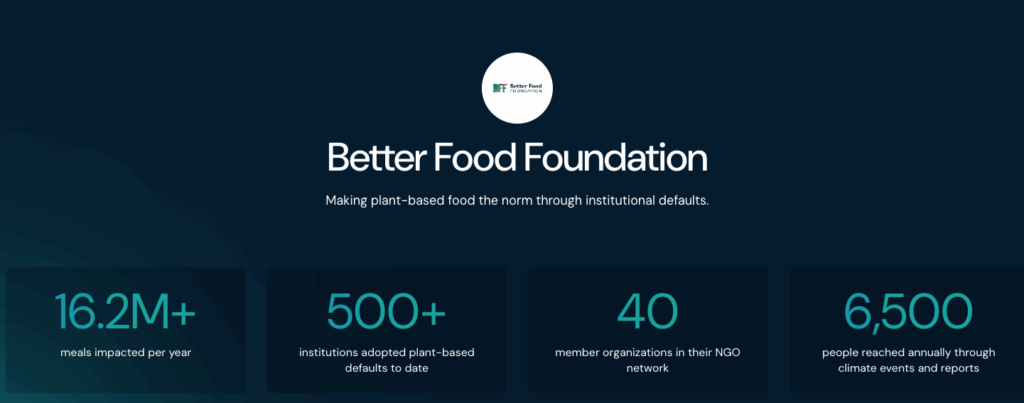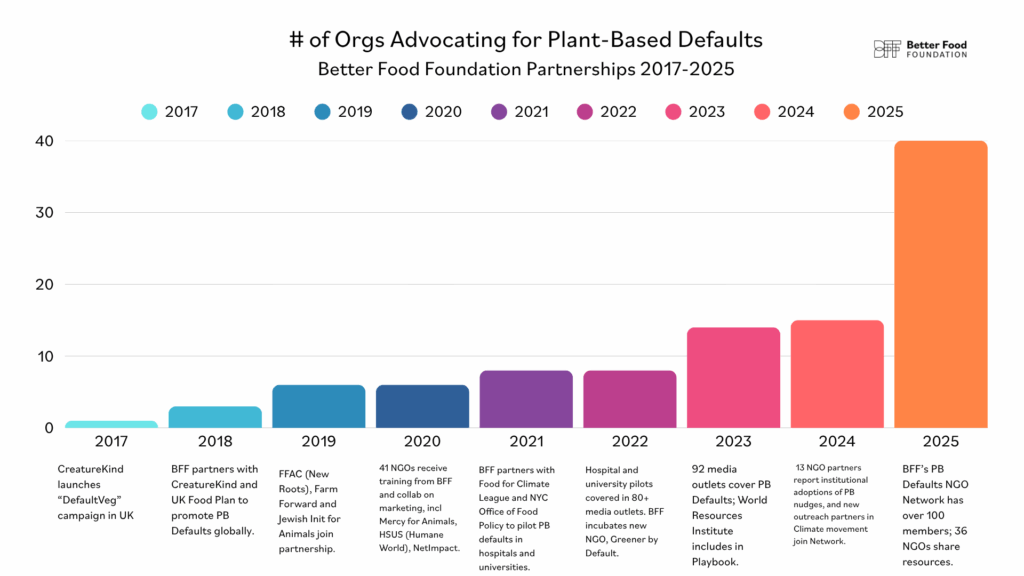3 Key Insights from the Animal Charity Evaluators
This week, Animal Charity Evaluators (ACE) published its review of Better Food Foundation (BFF). As the first ACE review of BFF and one of only 10 organizations selected, this presents a tremendous opportunity to share BFF’s work with a broader audience of funders and advocates, while planning our 2026 strategies and impact. Here are three key insights from this review process:
- ACE’s calculations validate the massive effects of the plant-based defaults strategy, although they represent only a fraction of this strategy’s past and future impact.
- The scaling success demonstrates the effectiveness of collaboration and movement-building across multiple organizations.
- Early-stage funding was crucial for this growth, highlighting the need for funders willing to invest in promising strategies before extensive empirical data are available.
1. ACE’s Impact Calculations Validate Our Strategy—But Show Only Part of the Picture
The Impact of Behavioral Science on Food Choice
Third-party validation of BFF’s impact data is invaluable. ACE’s review, which evaluated our 2024 accomplishments, thoroughly analyzed our data on plant-based defaults and nudges implemented at colleges and universities through BFF and our partners. Their analysis produced impact numbers that exceeded even our conservative estimates.

Animal Charity Evaluators’ impact estimates for Better Food Foundation
These figures matter because our goal has always been to identify and scale diet-change strategies that make a significant impact—creating large enough shifts in meal choice to redirect production towards more plant-based proteins while reducing the need for animal ingredients. The data confirms that our investments in plant-based defaults expansion have been effective.
Broader Impact of Plant-Based Defaults and Choice Architecture
However, ACE’s methodology examined just a slice of BFF’s work—specifically, our 2024 activities focused on institutional food change. While significant (including Sodexo’s implementation of plant-based nudges at approximately 400 universities and our student advocacy leading to successes at many universities and colleges), these numbers don’t capture the full growth trajectory since we launched this initiative in 2018.
Here’s what those numbers don’t include:
- Hospital System Expansion: Our 2022 pilot in 11 NYC public hospitals led NYC Health + Hospitals to implement plant-based defaults across their entire system in 2023, a permanent change. The results were remarkable: over 50% of patients chose plant-based meals (despite fewer than 1% identifying as vegetarian/vegan), and hospitals saved more than $462,000 per year, reducing carbon emissions by 36% while maintaining a 90% satisfaction rate among diners.
- Building on this success, Sodexo is now expanding plant-based defaults to approximately 400 hospitals across North America, with support from Greener by Default, which has potential to have a significant impact on meals, animals, greenhouse gas emissions, and human health.
- Growing Student Advocacy: Student advocates trained by BFF and its partners have secured additional adoptions of plant-based defaults and nudges at universities since 2024, particularly in campus coffee shops, where they’ve successfully implemented oat milk defaults and eliminated plant milk upcharges at seven universities. Our current student cohort is the largest ever—we started training 60 students this Fall to promote plant-based defaults on their campuses.
- Coffeeshop Industry Transformation: The campus initiatives build on the broader trend of major coffeeshop chains—Starbucks, Dunkin’, Peet’s, and others—eliminating plant-based milk upcharges at thousands of locations since Starbucks‘ policy change in November 2024. This achievement is driven by campaigns from Switch 4 Good, No Milk Tax, and PETA, which have run alongside BFF’s Oatmilk by Default campaign for the last several years. This industry-wide shift illustrates how ‘choice architecture’ approaches can be rapidly scaled across thousands of businesses.
- NGO Network Expansion: The plant-based defaults movement now includes 25 partner NGOs who have successfully implemented these strategies, up from 13 in 2024, and more than 40 NGOs who have joined our Plant-Based NGO Network. Beyond our direct partners, major environmental and health organizations, such as World Resources Institute and Menus for Change, have begun advocating for plant-based defaults through their own programs, creating ripple effects we’re still working to measure (see our most recent Adoptions List).
“The Better Food Foundation’s work in promoting Defaults, that’s the champion. “ – Cass Sunstein, Author of Nudge
2. Collaboration and Movement-Building Were Essential to Our Success
ACE’s Assessment vs. Our Network-Building Reality
One interesting aspect of ACE’s review was its assessment of BFF’s Plant-Based NGO Network, which was formally launched in November 2024. While ACE expressed low confidence in network-building as a strategy due to limited evidence within the animal movement, there’s a more nuanced story here.
New strategies inherently lack existing movement infrastructure. From the onset, scaling plant-based defaults required partnerships with organizations possessing complementary skills and target audiences. When we started, virtually no organizations were supporting plant-based defaults.
Building the Ecosystem We Needed
To build these partnerships, we had to raise funds to support—and sometimes create—the organizations with which we needed to collaborate. This led us to become a regranter, fiscal sponsor, and incubator of other nonprofits. To date, we’ve raised over $3 million for partner organizations and provided pro-bono fundraising, reporting, strategy, and marketing support.
After achieving “proof of concept” in 2022 with the NYC hospitals and Sodexo university pilots, we shifted focus from testing to training—educating other NGOs, professionals, students, and advocates to spread the strategy widely. Two of our team members launched Greener by Default as a specialized nonprofit in 2023, while BFF brought on new team members with expertise in education, professional development, and network-building.
Growth Through Collaboration
Since 2024, we’ve scaled plant-based defaults through a network of dozens of NGOs, webinars, workshops, media coverage, and training programs for hundreds of student advocates and university faculty/staff. The growth from 13 to 25 partner NGOs successfully implementing plant-based defaults is powerful evidence of the effectiveness of this approach.

NGO Collaboration to scale plant-based defaults strategy since 2018.
Although our formal network launch in 2024 may seem recent to ACE, building movement capacity through networking has been a fundamental part of our strategy from the outset. The success of plant-based defaults demonstrates the value of this collaborative approach itself.
I’ll explore the challenges and opportunities of scaling impact through networks in the diet-change advocacy movement in an upcoming post.
3. Early Investment in Promising Strategies Is Crucial for Innovation
Bridging the Proof-of-Concept Funding Divide
BFF launched the plant-based defaults initiative in 2018 with funds from a single donor. The strategy didn’t receive its second significant donation until 2022—a gap that, as a fundraiser with over 20 years of experience, I find troubling but understandable.
The turning point came in 2022 when NYC’s hospital system piloted plant-based defaults in 11 hospitals, Sodexo tested the approach in three university cafeterias, and we received our first major national media coverage, including in the New York Times and Bloomberg. Before this breakthrough, we approached many funders who consistently told us, “Come back when you have more data.”
While funders’ caution is reasonable, it highlights a challenge for innovation. ACE’s Recommended Charities methodology, rooted in effective altruism and empirical data, naturally favors established approaches. ACE recognizes this limitation, which is likely why they also created their Movement Grants program supporting “novel interventions.”
BFF’s Role as Strategy Innovators
BFF might be associated today with the plant-based defaults strategy, but since our beginning, we’ve also been a strategy incubator, and this spirit of experimentation continues today. While plant-based defaults have now reached the scaling stage, our team has also developed projects addressing dairy consumption, humanewashing, faith-based animal advocacy, and identity-based diet advocacy. Many of these initiatives live on as programs in other organizations we helped found and support. As the plant-based defaults strategy evolves, we continue to identify strategic gaps and support leaders, both in-house and within our network, in developing innovative solutions.
While these initiatives may be novel, the process of identifying, developing, and scaling strategies is not a new concept. BFF has delivered this work for nearly a decade, and our leaders bring extensive experience from previous roles in scaling innovative, solution-based ideas, initiatives, and programs.
Strategizing the Next Food Systems Revolution
I don’t think any of us believe we can achieve our goal of a sustainable, plant-centered food system with a significantly lower reliance on factory-farmed animals using only the established strategies.
We need both high-impact-per-dollar approaches and those that can attract paradigm-shifting investments. To achieve this, we require methodologies for evaluating promising strategies before extensive empirical data is available. Stay tuned for my forthcoming post, where I’ll recommend new methods to support innovative and novel solutions that can make a significant impact in our food systems.
To help us raise our 2026 budget to continue scaling plant-based defaults and developing innovative strategies, we invite you to donate.
To schedule a meeting to discuss our programs, contact our Director of Movement Building, Unny Nambudiripad ([email protected]).
Latest News
See All NewsACE Review Validates Plant-Based Default Strategy
3 key insights from the recent BFF review by Animal Charity Evaluators by Executive Director, Jennifer Channin.